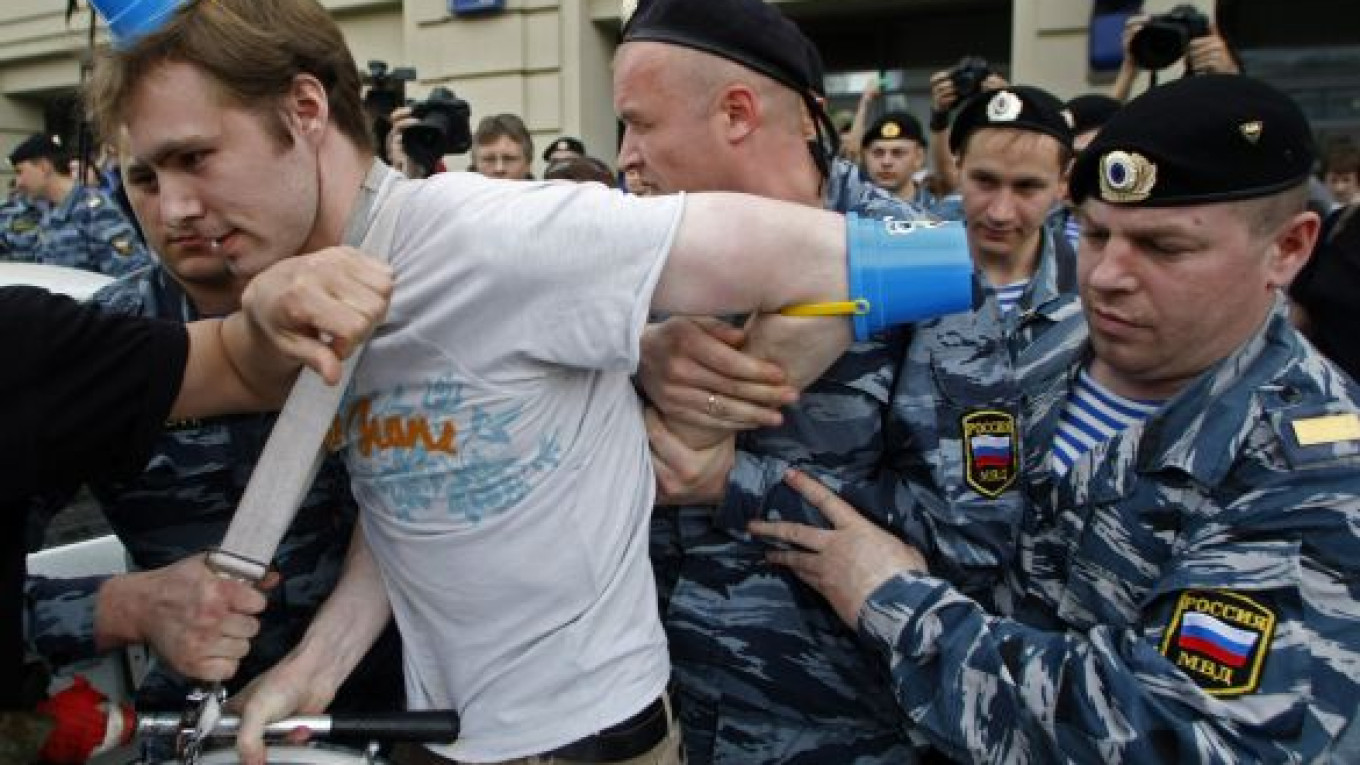Lawmakers from three parties have submitted a bill that would require protests using automobiles to inform authorities before hand amid a swelling number of rallies against special traffic privileges for officials.
Muscovites have been strapping blue buckets to the hoods of their cars in recent weeks to mock the flashing blue lights known as migalki that allow senior bureaucrats to drive into oncoming traffic and break other rules of the road.
In addition to cracking down on the migalki protesters, the proposed bill would also make it harder for drivers to organize. Car owners are among the best-organized political forces in the country, staging mass protests over high gas prices, import tariffs and corruption among traffic police.
The bill's sponsors included deputies from United Russia, A Just Russia and the Liberal Democratic Party.
Sergei Markov, a United Russia lawmaker in the State Duma and one of the authors of the amendments, said the bill was aimed against the possible organizers of radical anti-government actions.
“It often happens that the criticism of the some mistakes done by the government turns into the defamation,” Markov told The Moscow Times.
The amendments would require organizers of protests using vehicles to give three working days' notice, as opposed to registering three calendar days in advance of a planned street demonstration.
Under the current regulations, protests using cars are not covered as “public gatherings” and their participants can only be detained for traffic violations.
On Saturday, Moscow city police detained several participants of the Blue Buckets Society, who walked though downtown Moscow with blue pails and plastic cups attached to their heads but no posters, said Alexei Dozorov, the group's informal leader.
The Blue Buckets Society has organized several "marches" around the city, with drivers attaching blue buckets to the roofs of their vehicles. Traffic police have tried to ticket some drivers for violating cargo transportation rules.
Dozorov told The Moscow Times that about half a dozen people were detained Saturday during the "excursion" because one of the participants was wearing a sticker that read: "I am a migalka, I can do everything." They were all released without charges after about three hours in custody, he said.
“Today the authorities have no legal means to fight protests using cars. Since people aren't violating traffic rules, they're trying to create a loophole,” he said, referring to the new legislation.
Markov denied that the amendments were introduced to suppress movements like the bucket society, which have spawned imitators in St. Petersburg and other cities.
"I am against the growing number of people who use migalki. The actions are aimed not against the bucket people but against the Orange technologies that seek to make use those people,” Markov said, referring to the popular protests that overthrew the Ukrainian government in 2004.
Most federal lawmakers lost their right to a migalka in 2006 after the latest outburst of sentiment against the flashing blue lights and flagrant traffic violations. Now only speakers and deputy speakers of the State Duma and Federation Council may use the lights.
Sergei Obukhov, a deputy with the Communist Party, called the proposal undemocratic.
“The law violates the constitutional rights of the citizens,” he said. Although the car protests are not politically inspired, "the authorities see their actions as a threat to the country's stability."
A Message from The Moscow Times:
Dear readers,
We are facing unprecedented challenges. Russia's Prosecutor General's Office has designated The Moscow Times as an "undesirable" organization, criminalizing our work and putting our staff at risk of prosecution. This follows our earlier unjust labeling as a "foreign agent."
These actions are direct attempts to silence independent journalism in Russia. The authorities claim our work "discredits the decisions of the Russian leadership." We see things differently: we strive to provide accurate, unbiased reporting on Russia.
We, the journalists of The Moscow Times, refuse to be silenced. But to continue our work, we need your help.
Your support, no matter how small, makes a world of difference. If you can, please support us monthly starting from just $2. It's quick to set up, and every contribution makes a significant impact.
By supporting The Moscow Times, you're defending open, independent journalism in the face of repression. Thank you for standing with us.
Remind me later.


